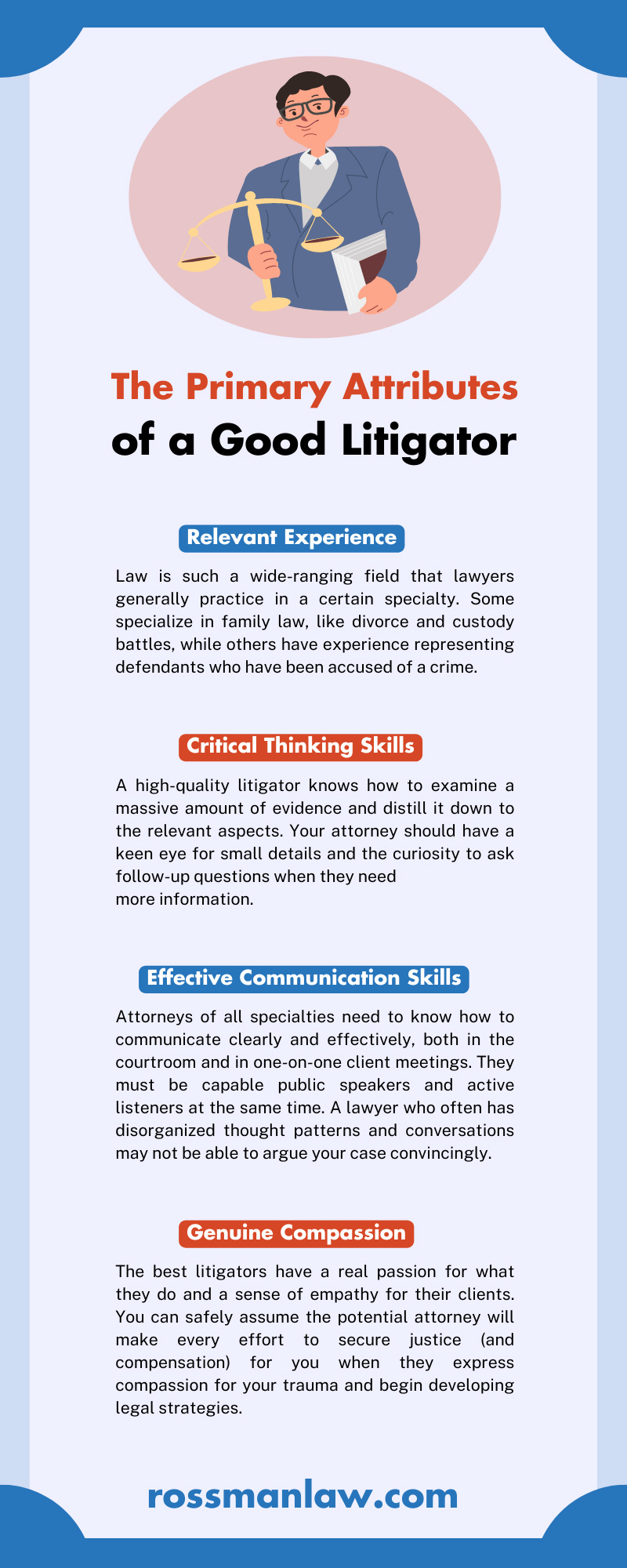
The Importance of Medical Evidence in Your Disability Case
August 7, 2023
The Role of Expert Witnesses in Proving Medical Malpractice
August 18, 2023Hiring an attorney is like buying real estate: the decision you make can have lasting consequences on your life moving forward, positive or negative. You’ve got to know what to look for when lawyer shopping to make a decision that will benefit you in the long run.
A litigator is a sub-category of attorney that specializes in civil law. Litigators represent clients who are looking to sue another party for things like negligence, malpractice, and discrimination. Their goal is generally to secure monetary compensation for their clients and seek justice for a traumatizing ordeal.
What are the primary attributes of a talented litigator? Which personality traits—and possible red flags—should influence your choice? Let the team at Rossman Law Group describe a talented attorney in layperson’s terms. As you interview different lawyers in preparation for your suit, stay alert and look for these positive qualities.
Relevant Experience
Law is such a wide-ranging field that lawyers generally practice in a certain specialty. Some specialize in family law, like divorce and custody battles, while others have experience representing defendants who have been accused of a crime. The litigator sub-category can be broken down into smaller branches like workplace discrimination, medical malpractice, and product liability claims.
Think about what makes your case unique and seek an attorney who has handled plenty of cases similar to yours. A lawyer who specializes in estate planning may not do you much good if you’re looking to sue your surgeon for negligence in the operating room.
Good To Know:
Many experienced litigators have handled a variety of civil cases. Look at the law firm’s website to see what their specialties are; for example, an attorney may be adept at handling both medical negligence and traffic accident claims!
Critical Thinking Skills
A high-quality litigator knows how to examine a massive amount of evidence and distill it down to the relevant aspects. Your attorney should have a keen eye for small details and the curiosity to ask follow-up questions when they need more information.
Your attorney’s critical thinking skills go hand-in-hand with a steady attention span. As you interview different attorneys and tell them your story, they should listen intently, take notes, and ask questions to show their interest.
Effective Communication Skills
Attorneys of all specialties need to know how to communicate clearly and effectively, both in the courtroom and in one-on-one client meetings. They must be capable public speakers and active listeners at the same time. A lawyer who often has disorganized thought patterns and conversations may not be able to argue your case convincingly.
In addition, their communication should be consistent and personable. If you call or email your attorney with a question about your case, they should get back to you in a timely manner. And even though many litigators are known for being argumentative and aggressive, they should always be polite and display that they care about your case.
Genuine Compassion
Even non-lawyers know that it’s difficult to craft a convincing argument when you don’t care about the issue at hand. As you interview different litigators, pay attention to their attitude as they hear your story. Do they seem like they have better things to do?
The best litigators have a real passion for what they do and a sense of empathy for their clients. You can safely assume the potential attorney will make every effort to secure justice (and compensation) for you when they express compassion for your trauma and begin developing legal strategies.
Legal Ethics and Honesty
Most litigators have a definite competitive nature to them; they like to win, and they’re ready to do whatever it takes to secure that victory. However, those strategies should not extend beyond the boundaries of law and ethics.
A trustworthy litigator will stress the importance of honesty in your case. They’ll actively discourage you from embellishing facts or outright lying on the stand. After all, they shouldn’t feel the need to exaggerate any evidence if the case you build together is solid and winnable.
A Knack for Arguing
Attorneys sometimes get a negative reputation in non-legal circles for their aggressive and sometimes contrarian nature. Those personality traits may seem off-putting at first blush, but they’re highly valuable attributes for a civil attorney. Litigators make their living by arguing, and they should do so without backing down easily.
You need a wage claim attorney who will fight for you if your employer has illegally garnished your wages or withheld your final paycheck! Talented litigators do not agree to lowball settlement offers, and they do not accept injustice. While your attorney should never be outright rude, they should be aggressive in representing your interests and not easily cowed.
Location, Location, Location
As you search for litigators, stick to your geographical area. Why? For a couple of reasons: first, you want to be able to visit their office for meetings without sitting through hours of traffic. Working with an attorney shouldn’t be unnecessarily time-consuming for either of you.
Second, laws and regulations vary from state to state—and even from county to county! You’ll need a litigator who knows the ins and outs of the law in your specific location.
A Strong Positive Reputation
As you whittle down your list of potential attorneys to represent you, do some research on- and offline. Do they have a website with reviews and testimonials? Have other folks in your area retained their services and spoken about their experiences?
Choose an attorney with a solid online presence and plenty of past clients who were satisfied with their work. A litigator with no website, no social media accounts, and no presence in the community may be trying to conceal a poor reputation or a disagreeable personality.
Don’t simply hire the first attorney that comes to mind when seeking a litigator to represent you in a civil suit. Interview multiple candidates and keep your eyes peeled for the top attributes of a good litigator. Your choice of representation could mean the difference between a lowball settlement and full, fair compensation for the harm you suffered.






